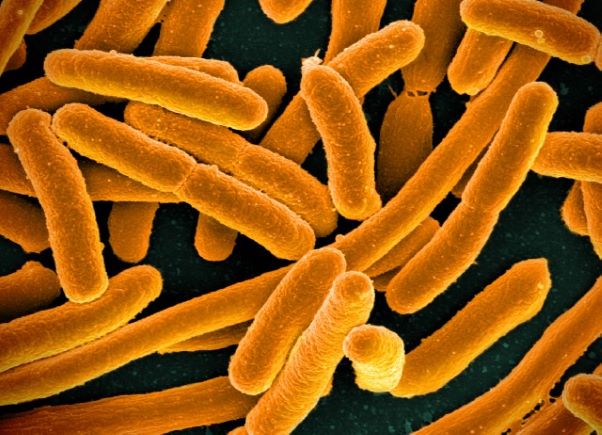Cellular response to urinary tract infection helps halt bacterial growth
 Image credit: National Institute of Allergy and Infectious Diseases, National Institutes of Health. Used under the terms of CC BY-NC 2.0.Researchers have identified a new bodily defense mechanism deployed in the fight against urinary tract infections (UTIs). UTIs are very common in adults as well as in about 8 percent of children, most frequently girls. The leading cause of UTIs is exposure to uropathogenic E. coli bacteria, also referred to as UPEC. While antibiotics resolve many infections, recurrence is common, and antibiotic resistance is rising; a better understanding of the natural course of UTIs could help lead to new treatments. In addition to flushing bacteria and infected bladder cells out of the urinary tract through urination, the body employs innate defenses, such as production of antimicrobial molecules, to stymie UTIs. In a new study, scientists examined one such molecule, the protein ribonuclease 7, to understand how genetic variations in the protein affect its antimicrobial properties and risk of UTI. By comparing girls in the NIDDK-funded Randomized Intervention for Children with Vesicoureteral Reflux trial or the Careful Urinary Tract Infection Evaluation study to age-matched girls without recurrent UTIs, the researchers discovered that girls with a common variant of ribonuclease 7 were more likely to develop UTIs. Further investigation using bladder cells grown in the laboratory revealed that increasing levels of the standard form of ribonuclease 7 helped prevent infection by UPEC. However, the variant form of the protein was less effective at fending off the bacteria. Discovery of the way common differences in the ribonuclease 7 protein affect its ability to defend against bacteria may help explain why some children are more susceptible than others to UTIs. These results also suggest that boosting ribonuclease 7 levels in the bladder might one day be a means for treating or preventing UTIs.
Image credit: National Institute of Allergy and Infectious Diseases, National Institutes of Health. Used under the terms of CC BY-NC 2.0.Researchers have identified a new bodily defense mechanism deployed in the fight against urinary tract infections (UTIs). UTIs are very common in adults as well as in about 8 percent of children, most frequently girls. The leading cause of UTIs is exposure to uropathogenic E. coli bacteria, also referred to as UPEC. While antibiotics resolve many infections, recurrence is common, and antibiotic resistance is rising; a better understanding of the natural course of UTIs could help lead to new treatments. In addition to flushing bacteria and infected bladder cells out of the urinary tract through urination, the body employs innate defenses, such as production of antimicrobial molecules, to stymie UTIs. In a new study, scientists examined one such molecule, the protein ribonuclease 7, to understand how genetic variations in the protein affect its antimicrobial properties and risk of UTI. By comparing girls in the NIDDK-funded Randomized Intervention for Children with Vesicoureteral Reflux trial or the Careful Urinary Tract Infection Evaluation study to age-matched girls without recurrent UTIs, the researchers discovered that girls with a common variant of ribonuclease 7 were more likely to develop UTIs. Further investigation using bladder cells grown in the laboratory revealed that increasing levels of the standard form of ribonuclease 7 helped prevent infection by UPEC. However, the variant form of the protein was less effective at fending off the bacteria. Discovery of the way common differences in the ribonuclease 7 protein affect its ability to defend against bacteria may help explain why some children are more susceptible than others to UTIs. These results also suggest that boosting ribonuclease 7 levels in the bladder might one day be a means for treating or preventing UTIs.
Pierce KR, Eichler T, Vasquez CM,…Spencer JD. Ribonuclease 7 polymorphism rs1263872 reduces antimicrobial activity and associates with pediatric urinary tract infections. J Clin Invest 131: e149807, 2021.
